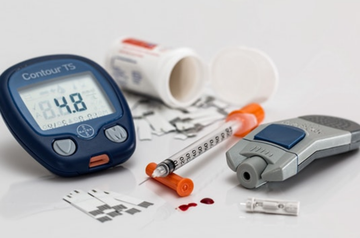Symptoms, Cause And Prevention of Diabetes in Women
Today there are few women who are unaware of diabetes, its symptoms and the consequences.
However, it is vital every now and then to have a discussion and get yourself updated on the latest information surrounding this prevalent condition.
In a 2016 publication, the Times of India reported that almost 50 million people suffered from diabetes in India, which is some of the highest numbers in the world. It is estimated that about 80 percent of the cases are noted in the middle of low-income classes in India. The cases are only estimated to double in the next 15 years.
Despite these troubling numbers, most of the medical faculty agree that if one takes an effort to get diagnosed early they can avoid the severe symptoms and further struggles associated with the condition. Diabetes is a treatable and preventable condition.
For a better understanding, it would be good to know that there are two types of diabetes. The type 1 diabetes, which is not so prevalent and is commonly diagnosed in childhood. The other is type 2 diabetes, which is more common and diagnosed in adulthood.
Today we will talk about type 2 diabetes, and signs of type 2 diabetes in women for which most people currently require diagnosis and prompt treatment.
What is Type 2 Diabetes?
Type 2 diabetes or diabetes mellitus is caused by the resistance of cells to the insulin that is produced. Insulin is a hormone produced by the pancreas, which enables the use of glucose in the body.
There are many risk factors that have been associated with diabetes and increase one’s likelihood of getting diabetes in their lifetime. They are:
Genetically transmitted Diabetes
Having close relatives who have diabetes, might increase your chances of having the condition. You should also take note of the age at which they were diagnosed. However, just because your family has the condition, it isn’t necessary that you will eventually have the same condition.
Diabetes due to Obesity (or overweight)
This is a no-brainer. Most people know that being overweight or obese is associated with a host of negative effects. Diabetes is just one of them. Being sedentary adds to this and increases your chances further.
.jpeg)
Having Prediabetes
This is when one or more of your blood tests show up with borderline results of your sugar levels. This increases your chances of it progressing onto diabetes.
History of Gestational Diabetes
Many women are diagnosed with diabetes when they are pregnant. Once they deliver most of these symptoms subside. However, having a history of gestational diabetes increases your chances of getting diabetes in the future.
Polycystic Ovarian Syndrome (PCOS)
This is a hormonal condition where there is an increase of male hormones in females. This condition leads to many other harmful conditions like heart disease and diabetes (due to resistance to insulin) caused by PCOS.
Other associated Risk Factors
This includes a high blood pressure of greater than 140/90 mmHg and increased triglyceride levels of over 150 mg/dl.
Above is a simple list of factors, from which either one or a combination can lead to a diagnosis of diabetes. It is also important to remember that the older you get the more chances you have of being diagnosed with this. If you are above 45 years of age, with one or more of the above factors, your chance of being diagnosed with the conditions increases significantly.
What are the Symptoms of Diabetes in Women?
A commonly known symptom is: Very often patients present with frequent urination, increased appetite, and increased thirst. These are what is known as classic symptoms of diabetes. Due to the increased glucose in the body, people tend to urinate more to expel this glucose, which in turn leads to more thirst, due to dehydration.
The abnormally high levels of glucose present in the body are also unable to enter the cells in the body. This is mainly due to the insulin resistance. The decrease in energy produced by the cells causes a person to feel hungry with a voracious appetite, to compensate for the decreased energy.
While these may be common early symptoms of diabetes. These include:
- Tingling and numbness in the lower extremities
- Decreased vision that may be blurry
- Frequent vaginal yeast infections
- Wounds that heal poorly
- Unexplained fatigue
- Episodes of losing consciousness
The list above is more indicative of a progressive condition. People who have had high blood glucose (hyperglycemia) for a while and are unaware of it might show one or more of the above signs and symptoms. The main thing to do in such a case would be to contact your doctor so that you can have your blood glucose tests carried out along with some other studies that are vital before the medication is started.
What are the different ways for Diabetes Treatment?
First and foremost in any condition, your doctor will recommend modifying your diet and lifestyle. You will be asked to cut back on some ingredients in your diet that increase your chances of getting diabetes and follow a fitness regime.

After you have made a few changes, your doctor will check your sugar levels after a few months. If it is the same or increased you will be started on medications. You will routinely have to follow up with your doctor to check your medications and your sugar levels.
In rare cases, if the diabetic condition cannot be controlled with medication, insulin injections are usually given.
How can a Diabetes be Prevented?
As mentioned above, some people might be prone to getting diabetes, mainly because their relatives have it. However, this isn’t always true. Many people who decide to lead a healthy lifestyle rarely end up with diabetes.
Precaution is the best prevention of Diabetes
You might be aware through the various health campaigns and multiple doctor visits, maintaining a healthy weight and eating a nutritious diet reduces your chances of getting diabetes or any other condition for that matter.
You should regularly do yoga to lose weight.
Heart disease, polycystic ovarian syndrome, stroke, have all had associations with a poor lifestyle. Smoking cessation, decreasing alcohol consumption, eating healthy and including exercise in your life daily, have all shown to have a positive effect in reducing the chances of getting diabetes.
Getting diagnosed early is also important in halting the progression of the condition.
Avoid Diabetes Causing Food
People are advised to eat healthily. This includes cutting back on carbohydrates and sugars, the main calorie-containing items in the diet. These usually include rice, bread, pasta and baked items.
Such ingredients usually break down into glucose in your body, making it harder for the body to process the large amounts of glucose. You can trade this in for whole grain options. Cutting back on sugary items like chocolates, sweets and the variety of desserts is also advised.
Filling your fridge with healthy fruits and veggies is the way to go. Opt for smaller meals, which reduces the load your body has to process after a meal.
Be Physically Active to Reduce Diabetes
Once you have your diet in check next you have to make sure you get some exercise daily. Exercise is known to reduce glucose levels in the blood. This is because exercising muscles make use of glucose as energy, with little or no help from insulin. A short 30- minute walk has also been associated with better cholesterol levels and reducing high blood pressure levels. In addition to this, the endorphins released improve mood, sleep, and assists in managing stress levels. All quite important in managing diabetes in the long term.
So hopefully you are a little more informed today on the causes and prevention of diabetes. Once you notice a few symptoms over a prolonged period of time, it would be best to consult your primary care physician. They will help in the diagnosis and treatment of the condition. It is ideal to maintain a healthy lifestyle and avoid all these hassles in the first place. However, never hesitate to consult your doctor when you might be faced with any concerning symptoms.
In order to stay aware of such Signs and Symptoms, it would be best if you would join the Health Tips Community on SHEROES!
















